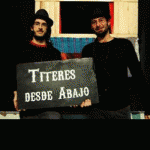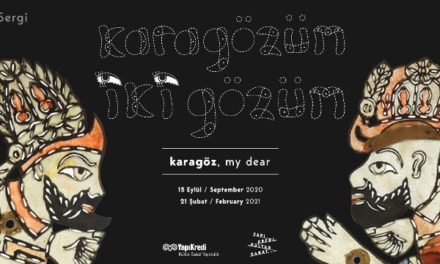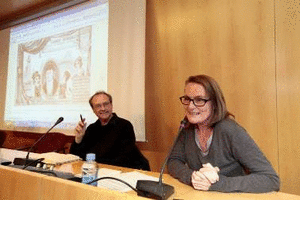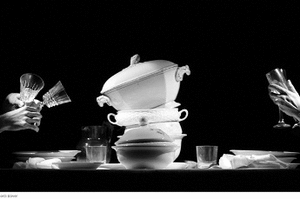It is quite incredible that such things can still happen! Two pupeeteers have been imprisoned for a knockabout show that may be a bit strong but which is, nevertheless, in keeping with the style of such shows as they have always been performed, both in Spain and throughout Europe. Two young puppeteers, just starting out in the genre of knockabout, street puppet theatre – one of the most difficult forms there is, demanding that one keeps an eye on current events – have taken the rap for a series of confusions, and for reactions that are completely out of place.
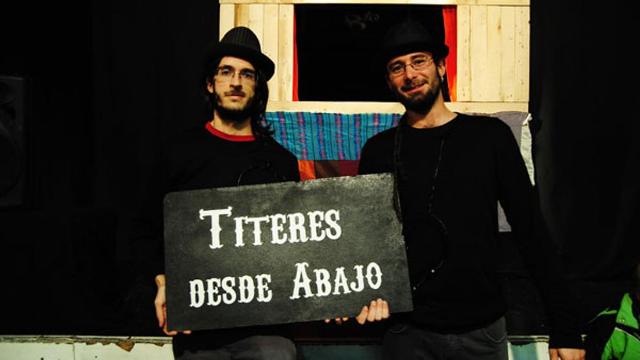 Raúl and Alfonso, of Títeres desde Abajo (Puppeteers from Below)
Raúl and Alfonso, of Títeres desde Abajo (Puppeteers from Below)
If an error was made over this performance during Madrid’s Carnival, it was the fault of programmers who were not capable of putting the show in the right venue. A show of this kind is, in general, performed in places where the audience can take it and understand it, though they may decide they don’t like it; cafés, bars, cabarets, cultural associations, festivals, private parties, and so on, and always for an adult audience. But even taking into account this error, what programmer has never once got it wrong, cringing as a show proves not to be what was expected? The solution, if a show is so offensive for the parents and children present – though doubtless more so for the adults – is for the programmers to apologise; and, furthermore, if they are in political office and the situation has been taken advantage of by one side and another for political gain, then they should resign (as I believe is the case), and that’s the end of it. But to arrest the puppeteers, who were simply fulfilling their professional responsibility, is a major blunder!.
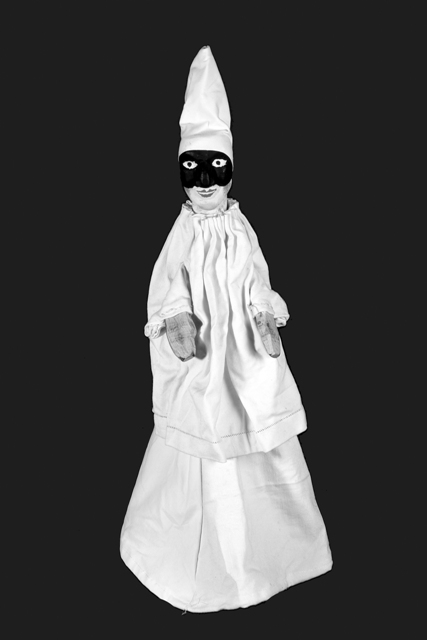
Pulcinella, by Bruno Leone. Origin of the knockabout puppets of Europe. TOPIC Museum, Tolosa
There are illustrious precedents to this kind of show, and no-one has ever ‘rent their garments’ – if we except the politically-correct hypocrisy of certain crowd-pleasing leaders.
Pepe Otal, in the nineties, staged a Makoki – a famous character from a Barcelona underground comic – that was incredibly violent; but always acting in cafés and bars, or at festivals late at night. He adopted and exaggerated the traits of traditional glove puppets, which have always delighted in having a resounding stick fight. Pepe Otal’s Makoki has gone down in the annals of theatre history as one of his best known and most widely performed shows – in spite of its highly incorrect nature.
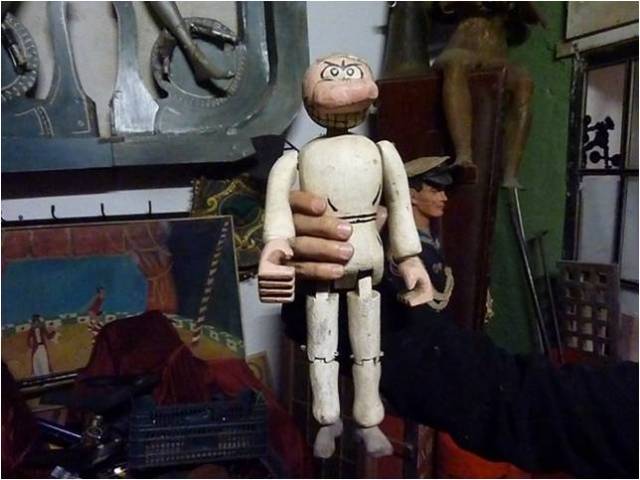 Makoki by Pepe Otal
Makoki by Pepe Otal
The show by the company Títeres desde Abajo (Puppets from Below) falls into a very specific tradition, that of knockabout glove puppets, found all over Europe and descended from the Neapolitan Pulcinella. Federico García Lorca wrote plays dedicated to the genre, which he praised in spite of the cruelty of its central character in Spain, Don Cristóbal; a heartless, dirty old man, who ends up killing everybody.
Ramón de Valle-Inclán’s “Esperpento” style took inspiration, precisely, from street puppet theatre, particularly from the solo “Bululú” performer. The playwright explains this in the prologue to ‘Los Cuernos de Don Friolera’ in which he puts highly-charged language into the mouths of puppets. It is a fiercely cruel work with an outcome that reads like a horrific police report. The prologue of this work, performed with puppets, received its premier in the home of the famous author, Pío Baroja, no less.
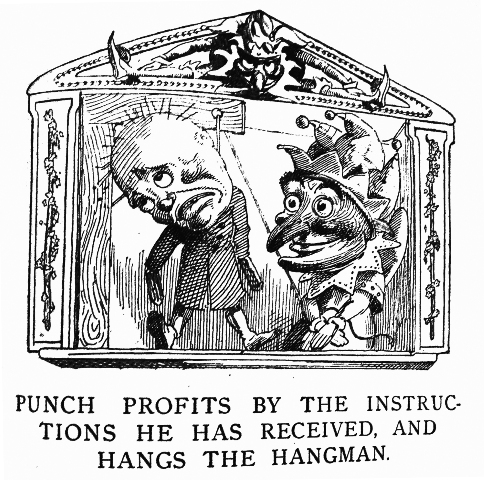
Ilustration from the book ‘The Wonderful Drama of Punch and Judy and their little Dog Toby’.
Another example of scandalous, knockabout glove puppets is the British Punch and Judy show, listed by the national government in 2006 as one of twelve icons of Englishness. Strange that the character, Punch, who – fed up with its crying – throws the Baby out of the window, beats everyone else with a stick, hangs the Hangman (and sometimes the Policeman who wants to hang him), and who – by means of his famous sausage-making machine – turns into sausages the Devil, the Crocodile, the Policeman, the Thief and sometimes even the Baby, is still alive and well on the puppet stages of Britain. He had an illustrious defender in Victorian times, when he was the objet of one of the many campaigns directed against him.
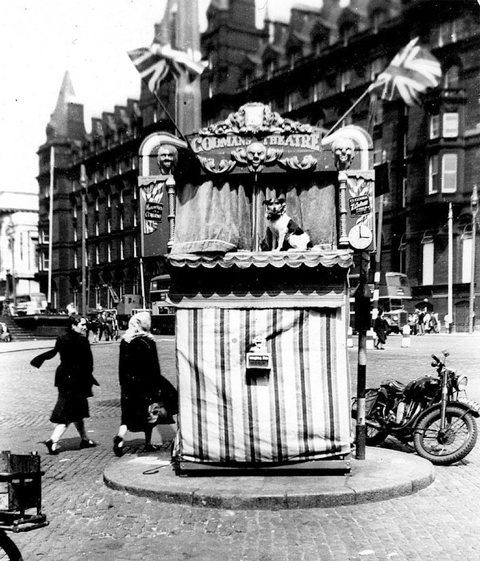
Punch and Judy theatre on the streets of Liverpool.
Charles Dickens said: “In my opinion the street Punch is one of those extravagant reliefs from the realities of life which would lose its hold upon the people if it were made moral and instructive. I regard it as quite harmless in its influence, and as an outrageous joke which no one in existence would think of regarding as an incentive to any kind of action or as a model for any kind of conduct. It is possible, I think, that one secret source of pleasure very generally derived from this performance… is the satisfaction the spectator feels in the circumstance that likenesses of men and women can be so knocked about, without any pain or suffering. (The Letters of Charles Dickens Vol V, 1847 – 1849).
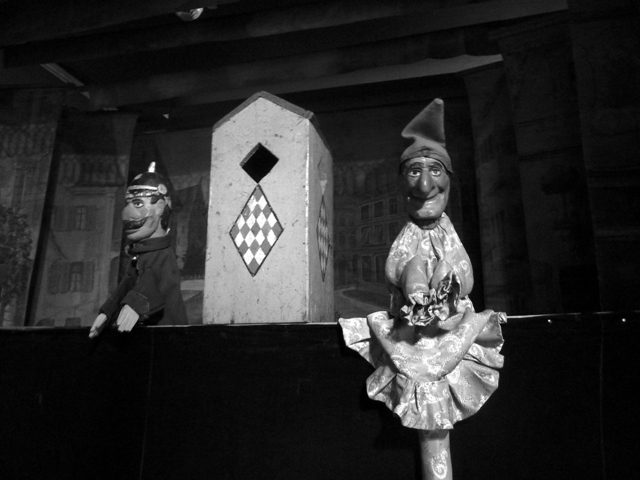 The German Kasperl, and his eternal rival the Policeman. Stadtmuseum, Munich
The German Kasperl, and his eternal rival the Policeman. Stadtmuseum, Munich
It would, certainly, never cross anyone’s mind in London, or any other city for that matter, to march a Professor of Punch and Judy off to jail. To start with, would he or she not immediately receive the support of the Queen herself? At the annual Garden Party in Buckingham Palace, one of the most extreme and virulent of Punch and Judy puppeteers, John Styles, used always to be on the programme.
For all these reasons, we request and demand, from the online magazine Puppetring, the immediate release of our colleagues, Raúl and Alfonso of Títeres desde Abajo.
Signatures can be added to the petition organised by Raúl and Alfonso’s colleagues in Barcelona: http://www.ellokal.org/libertad-titiriteros-basta-de-manipulacion-libertad-de-expresion/#.VrZ8PVKRj7w

